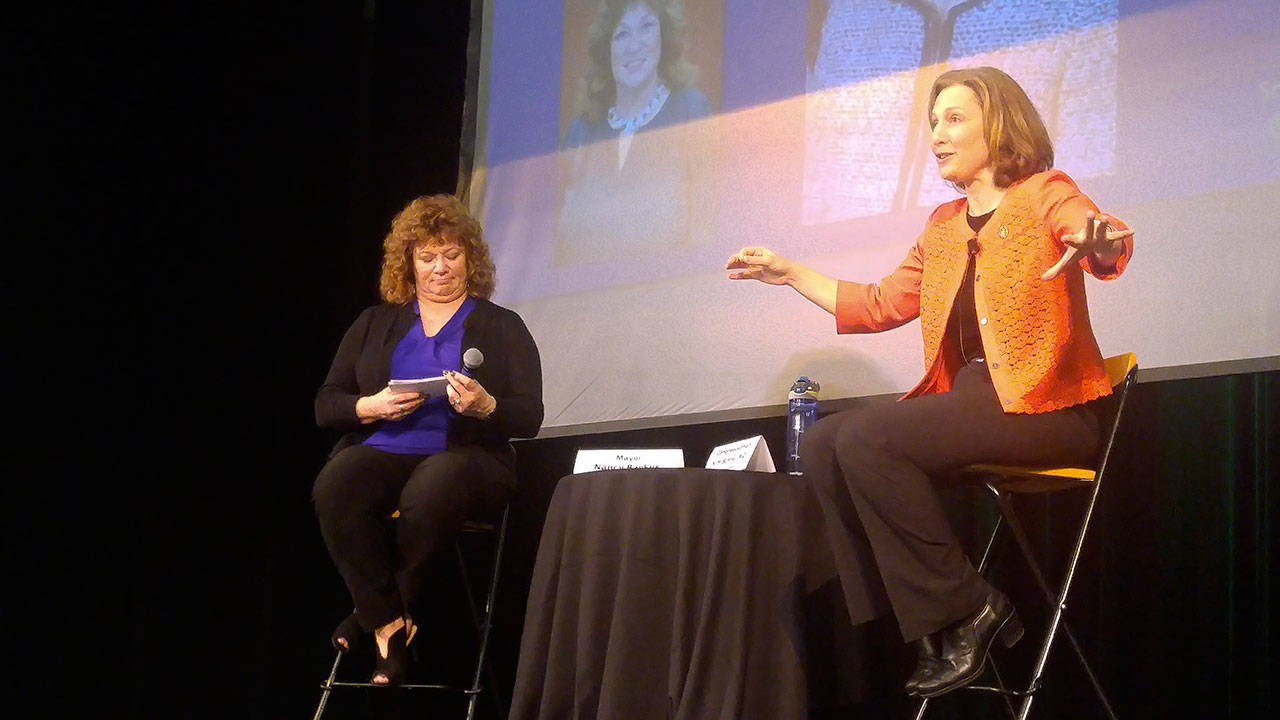Kim Schrier had expected to be a pediatrician for the rest of her working life, then retire, perhaps teach.
But as the Eastside doctor and Democrat told an audience at the Green River College Student Affairs building last Wednesday, April 17, Donald Trump’s 2016 election as president changed the long-established trajectory of her life.
Suddenly, with all that mattered to her in seeming peril, from the environment to families and public education, but especially health care, Schrier chose to run for office.
“I decided maybe it was time for the diabetic pediatrician who’s been working with families in this district to really be the one to step up and go protect health care for all of us,” Schrier recalled thinking.
In her first foray into elective politics, Schrier beat Republican Dino Rossi in last November’s general election, succeeding retiring Auburn Republican Dave Reichert and becoming the first Democrat to hold the 8th Congressional District House seat.
Since then, Rep. Schrier has been busy.
Schrier, the only woman doctor in Congress and its first pediatrician, is co-chair of the New Democrats Health Care Task Force. Already, she said, she has co-sponsored legislation to shore up the Affordable Care Act, to ensure that protections for people with pre-existing conditions remain, to extend subsidies to people earning 600 percent of the poverty level, instead of 400 percent, and to ensure that no family pays more than 8½ percent of its income on health care premiums.
“Those are big fights that will make a meaningful difference in what health care costs and make health care more affordable, more acceptable,” Schrier said.
Already, Schrier said, serious House investigations are underway into the rationale for pricing prescription drugs.
“Just last week, we did hearings on insulin,” Schrier said. “Why is it … that insulin has gone from $40 a bottle about 20 years ago to $295 today, even higher than when I was running for office? Somebody’s got to answer for that, and we need to address these costs that people are feeling every day.”
Among other causes the freshman congresswoman has embraced, she said, are ridding politics of special interest money, protecting the environment and defending reproductive rights.
Freeing the legislative process of corruption and special interest money, she said, was and is important to her. Indeed, House Resolution 1, the first bill out of the door this session, was intended to eliminate all the paid special interest money in politics.
“We can’t overturn Citizens United, but it was basically saying to these super pacs, ‘You need to declare who your major donors are.’ It (HR1) ends partisan gerrymandering and makes it easier and not harder to vote,” Schrier said. “It does all the things that we should be doing to give the government back to the people, including a 6-to-1 match for small dollar donations, that is, anything up to $200.”
About the Earth
Schrier has joined the Sustainable Energy Environmental Coalition, a group of representatives from throughout the country that has committed itself to doing everything in its power to address climate change.
“I’m glad to see that, finally, we’re not putting science on trial, we’re actually bringing scientists in for hearings. We have a special committee on climate change, and we have a science committee that’s actually looking at science and using evidence to make decisions,” Schrier said. “We are working on a plan that will bring clean energy and jobs and infrastructure, so that everything we build should have in it a green element, so either a new electrical grid or battery storage or carbon capture or all of the above.”
Schrier is a member of the House Agricultural Committee, serving on two its subcommittees, one of them being horticulture and bio-tech. Having her sitting there, she said, was important for the 8th District as Pierce County has a lot of farmland and a great portion of the district is on the other side of the Cascade range. Until now, she noted, there was nobody to represent the region on the agriculture committee.
“I am so delighted to find that there is a ton of energy behind finding ways to support our farmers as they use farmer-to-farmer technology and know-how to convert from petroleum-based products like fertilizers, and to do regenerative farming and low-or-no-til farming to enhance the soil,” Schrier said of the steps that will reduce carbon in the atmosphere.
“It’s such a win-win for farmers, and it’s such a win-win for the rest of us,” Schrier said. “(Secretary of Agriculture) Sonny Perdue is even on board, and he will tell you about seaweed supplements that we can give to cows so that they secrete, belch, whatever, less methane, which is 30 times more potent than carbon dioxide.”


